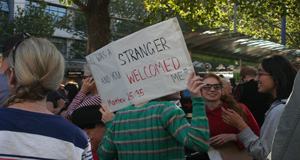September 24, 2018
Mercy Day
We live in one of the most deprived areas in England in a small, street house. Traditionally, waves of new immigrants have arrived in this part of London and moved on as they became more prosperous. In recent years the number of people arriving in search of a better life or escaping persecution has increased dramatically.

We have become involved with an established charity, RAMP (Refugee And Migrant Project), which offers support to those who are not receiving help from any other source. RAMP has supervised trainee social workers to assist the clients navigate the challenges of claiming asylum and obtaining housing along with other matters. A nurse attends most weeks to give advice with minor medical matters and signpost the people to the NHS. A food bank offers basic supplies, often containing items unknown to the recipient who is encouraged to try new recipes.
What have we learnt? We have been humbled by the resilience of the human spirit and the strong faith of many of the asylum seekers we have met, regardless of their educational or economic background. Some people are hesitant to reveal their traumatic stories and suspicious of those who ask them questions. They are in great need of a gentle, accepting, companioning, especially in the early stages of our acquaintance with them and we have learned to take time and great care in opening these conversations. Most are deeply grateful for the little we offer. Similar to our experience in listening to others in need, these vulnerable people, having opened up something of their pain to us, often leave us by saying 'Thank you, you have given me such good advice....!'
A compassionate listening and the kind word are certainly appreciated by these lonely, and sometimes confused, people and this in turn gracefully nurtures us in our Mercy Charism.
Messages to: Srs Margaret Duffy and Monica Butler